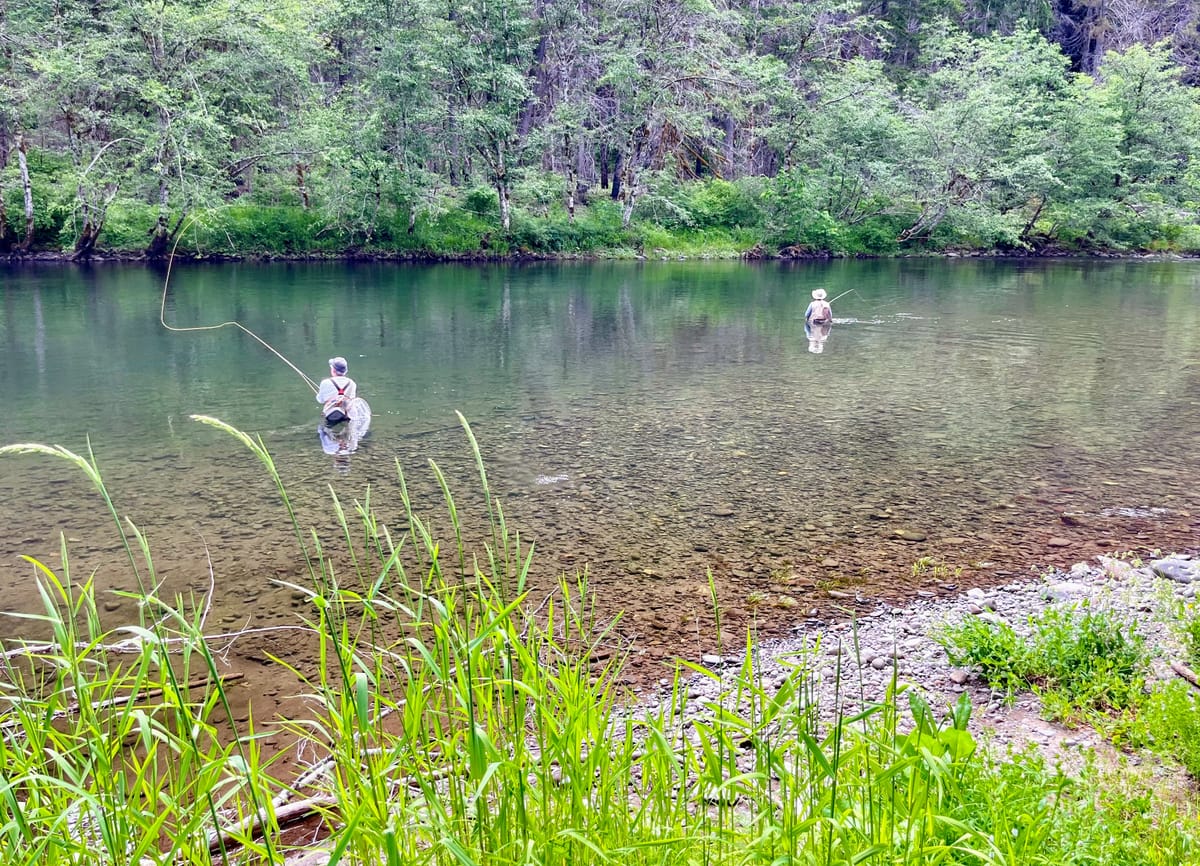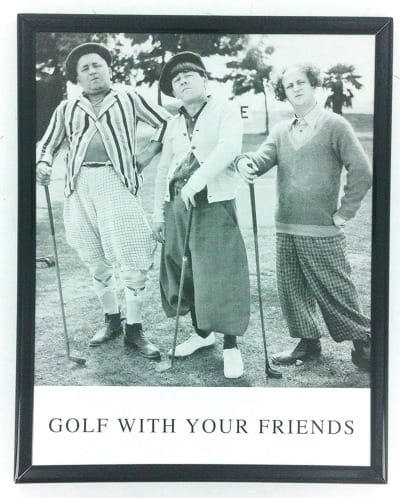How to not look like an idiot when you first start learning to fly fish
Three ways to conquer the self-consciousness that comes with beginning fly fishing and start building your fly fishing practice

We start every Intro to Fly Fishing class with a few simple questions:
- What's your name? Where are you from?
- Have you fished before? Fly fished?
- What do you hope to get out of this class?
Last week, we fielded our seventh cohort of beginners. Over 70 folks have come through the program in the first year. And I noticed something consistent across all the groups.
When they get to what they hope to get out of the class, one of the first couple of learners says something to the effect of "I don't want to look like an idiot". And then every subsequent participant includes that in their response.
Every. Single. Time. "I, too, do not want to look like an idiot."
Of course. No one wants to be laughed at, or shunned, I get it. It's rough to be a beginner. But, the first and only objective for a new fly angler should be to get time on the water. That's it.
Time on the water is where you'll learn to set up and take down your equipment, manage your fly line as it floats all around you, get spatial awareness for your back cast, and begin to see changes in the ecosystem depending on time of day and time of year.
"Time on the water equals fish."
- Denny Breer, Green river guide, Trout magazine
Here's the secret: it doesn't need to be the best water.
Step one: Get out of your driveway
My first true sports love affair was with skateboarding. I loved everything about it: the freedom, the attitude, the culture.
But, I was marooned in a suburban cul de sac. The closest skate park was a two hour drive way. Our town had two known skate spots: Efros Drugs and an abandoned Mobil gas station. Everywhere else, you'd be run off by the police within ten minutes of starting a session.
Even worse, there were older, more hardcore skaters at those spots. To show up and embarrass yourself in front of them would be mortifying.
I wish I could say I didn't care what they thought about me, and did my thing. But I didn't. I practiced alone in my driveway. I got really good at doing tricks while standing still: ollies, pop-shove-its, kick- and heel-flips.
But I knew soon enough I'd need to get rolling, literally, if I wanted to progress. My solution was to find spots to skate that were not perfect, but better than my driveway. Maybe they had a little bit of transition I could practice on. Maybe they had a longer curb I could wax up.
When you're a beginner angler, the local golf course pond, a tiny neighborhood stream, anything that holds moving-ish water can do. Claim that water as your place to look like an idiot. Own the space.
You probably won't encounter many other people. You certainly won't encounter other anglers. But, open up to the idea that it's OK for you to be the neighborhood clown in this zone. Most people will have no idea what you're doing anyway and just write you off as a kooky angler.
Finding your own private corner isn't without its perils. My dad tells a story of taking his new fly fishing setup out into the Huron river in Ann Arbor, Michigan.
He chose a city park as the place to test his new waders and rod, and within a few minutes found himself knee-deep in the silty river bottom, unable to move, in front of a group of families spending their afternoon with a picnic on the river bank. Extricating himself took some doing.
So, you probably still need to do some research, especially when it comes to getting into the water.
Step two: Develop a routine
William Finnegan's writing about surfing is a treasure.
And in a recent New Yorker profile of Jock Sutherland (son of world-famous paddler Audrey, among other qualifications) Finnegan reveals some of Sutherland's impermeable, longstanding routines:
He’s even bossy about how to end a session. I’ll throw my board in a car and maybe put on dry clothes and head off. In Jock’s world, you find the hose under the bushes behind the old house, then wash the salt off not only your body but your board. (That’s new.) You wrap the leash just so around the fins or, better, remove it from the board entirely, coil it carefully, and then dry the board with a towel. (Also new.) Then, if necessary, you rub the bottom of the board with a foam-filled nylon sock called a Pickle. (A Pickle?) Then you slip the board gently into an immaculate bag, and slip all that gently into the van.
There’s more. As you wrap a beach towel around your waist to change, be careful to keep your feet free of dirt. There’s a designated little rug to stand on, and a rag to clean your feet. And, speaking of feet, cross the yard only at certain angles, because some patches of the grass have sharp little stickers. Wet trunks and rash guards go in a special bucket.
I resist all this rigmarole the first few times we surf together. Jock shakes his head in pity and disapproval. Then, one day, I decide to do everything his way, just for the hell of it. Rinse the board, dry the board. Wet trunks in the bucket. The rituals are oddly soothing. It’s the upside of O.C.D.—everything in its place. These boards will last forever the way we’re treating them.
“Now you’re gettin’ it, Bill.”
As a beginner, it's important to establish routines. Try and make the steps as small as possible. There are a million little questions to figure out how to ask and answer in every session, and each leads to the next.
- Where do you put your tools? Tippet? Flies?
- How do you set up your rod? When?
- Where do you decide which fly to use first?
- How will set up your first cast? How much line will you take out?
Take note of what you don't know, or what feels less elegant than it could be. The more time you take and isolate these little decisions and movements, the more second nature they become.
When people say "I don't want to look like an idiot" they don't think about getting stuck in the mud and having to call to people on the bank for help. They think about flailing a fly line around, wrapping themselves in it, getting snagged up on a bush. They think about the failing to achieve the elegant cast we're conditioned to associate with great fly fishing.
And, while you're working through this routine, you're not flailing away in the crick or golf course pond and getting wrapped up in fly line and falling all over yourself. You're learning to manage your tools, chiefly your rod and fly line. The routines you create to manage these tiny bits will stay with you for your entire fly fishing life.
As another great guide once told me:
"If you can manage your line,
you can manage your life."
- Chris Stroup
Step three: Find other idiots

My high school Spanish teacher, Señor Diehl, had this poster in his classroom.
It never fails to come to mind when I think about how helpful it is to have a beginner buddy or two. When you're bad at something together, it can become a fun game in itself.
A third non-fly-fishing related anecdote is from the early days of advertising agency Saatchi & Saatchi, as detailed in the book The Brothers. After they decided to go into business for themselves, Maurice and Charles Saatchi, along with friend Martin Sorrell (all now, I think with appropriate pseudo-royal titles) had to find clients.
So, they got a phone book, and dialed businesses one-by-one until they found folks who needed advertising. They got a lot of rejections along the way. But, instead of the hang-ups and haranguing being negative, they became a funny game. Something the crew could bond over.
If you find a few friends, or a group, of folks who are in a similar stage in your angling, you have great company to be idiots together.
I encourage every graduating group of alumni from our little Intro program to stay in touch, to find opportunities to fish together, and to enjoy that strength in numbers, because it does a great job of diminishing the fear of looking like an idiot.
When you were first starting out, what helped you get over looking like an idiot?
Tell us in the comments!
Upcoming classes
We're in the thick of Summer classes, and are headed up to the Clackamas watershed this week with an Outing group. You can find more info on classes here.
I'm incredibly grateful that Summer term has again sold out completely. We're just crossing our first anniversary in this program and have had over 70 students complete one or more courses. Thanks again for taking a chance, showing up, and coming back.
More classes will be offered in the Fall term, in September. I'll share the registration dates here as soon as I learn them.




